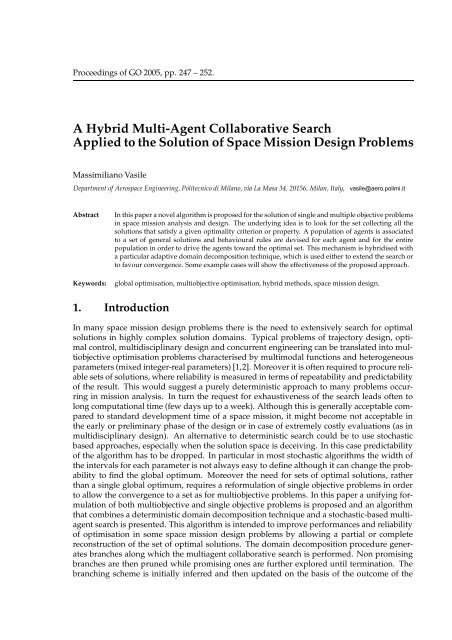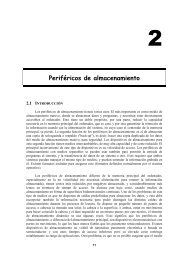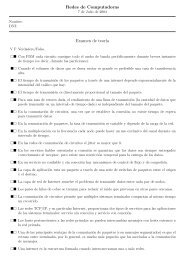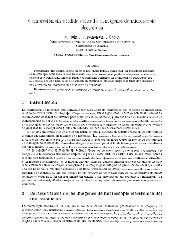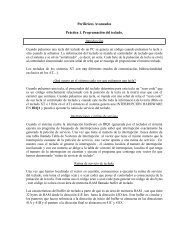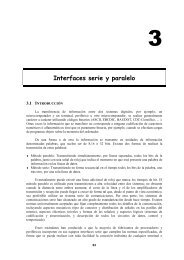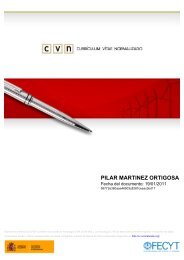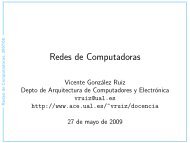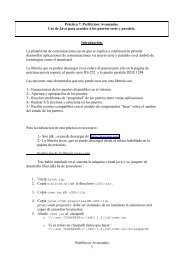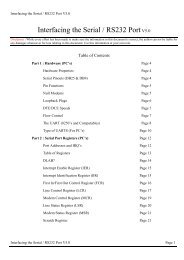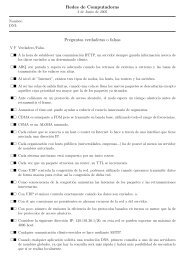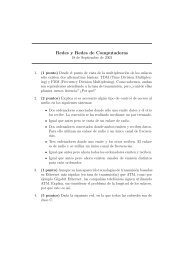View - Universidad de AlmerÃa
View - Universidad de AlmerÃa
View - Universidad de AlmerÃa
- No tags were found...
You also want an ePaper? Increase the reach of your titles
YUMPU automatically turns print PDFs into web optimized ePapers that Google loves.
Proceedings of GO 2005, pp. 247 – 252.A Hybrid Multi-Agent Collaborative SearchApplied to the Solution of Space Mission Design ProblemsMassimiliano VasileDepartment of Aerospace Engineering, Politecnico di Milano, via La Masa 34, 20156, Milan, Italy, vasile@aero.polimi.itAbstractKeywords:In this paper a novel algorithm is proposed for the solution of single and multiple objective problemsin space mission analysis and <strong>de</strong>sign. The un<strong>de</strong>rlying i<strong>de</strong>a is to look for the set collecting all thesolutions that satisfy a given optimality criterion or property. A population of agents is associatedto a set of general solutions and behavioural rules are <strong>de</strong>vised for each agent and for the entirepopulation in or<strong>de</strong>r to drive the agents toward the optimal set. This mechanism is hybridised witha particular adaptive domain <strong>de</strong>composition technique, which is used either to extend the search orto favour convergence. Some example cases will show the effectiveness of the proposed approach.global optimisation, multiobjective optimisation, hybrid methods, space mission <strong>de</strong>sign.1. IntroductionIn many space mission <strong>de</strong>sign problems there is the need to extensively search for optimalsolutions in highly complex solution domains. Typical problems of trajectory <strong>de</strong>sign, optimalcontrol, multidisciplinary <strong>de</strong>sign and concurrent engineering can be translated into multiobjectiveoptimisation problems characterised by multimodal functions and heterogeneousparameters (mixed integer-real parameters) [1,2]. Moreover it is often required to procure reliablesets of solutions, where reliability is measured in terms of repeatability and predictabilityof the result. This would suggest a purely <strong>de</strong>terministic approach to many problems occurringin mission analysis. In turn the request for exhaustiveness of the search leads often tolong computational time (few days up to a week). Although this is generally acceptable comparedto standard <strong>de</strong>velopment time of a space mission, it might become not acceptable inthe early or preliminary phase of the <strong>de</strong>sign or in case of extremely costly evaluations (as inmultidisciplinary <strong>de</strong>sign). An alternative to <strong>de</strong>terministic search could be to use stochasticbased approaches, especially when the solution space is <strong>de</strong>ceiving. In this case predictabilityof the algorithm has to be dropped. In particular in most stochastic algorithms the width ofthe intervals for each parameter is not always easy to <strong>de</strong>fine although it can change the probabilityto find the global optimum. Moreover the need for sets of optimal solutions, ratherthan a single global optimum, requires a reformulation of single objective problems in or<strong>de</strong>rto allow the convergence to a set as for multiobjective problems. In this paper a unifying formulationof both multiobjective and single objective problems is proposed and an algorithmthat combines a <strong>de</strong>terministic domain <strong>de</strong>composition technique and a stochastic-based multiagentsearch is presented. This algorithm is inten<strong>de</strong>d to improve performances and reliabilityof optimisation in some space mission <strong>de</strong>sign problems by allowing a partial or completereconstruction of the set of optimal solutions. The domain <strong>de</strong>composition procedure generatesbranches along which the multiagent collaborative search is performed. Non promisingbranches are then pruned while promising ones are further explored until termination. Thebranching scheme is initially inferred and then updated on the basis of the outcome of the


